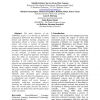133 search results - page 16 / 27 » High-Level Interpretation in Virtual Environments |
ICRA
2005
IEEE
14 years 2 months ago
2005
IEEE
Abstract— Autonomous mobile agents require object recognition for high level interpretation and localization in complex scenes. In urban environments, recognition of buildings mi...
IADIS
2004
13 years 10 months ago
2004
The main objective of the CONNECT project is to develop an innovative pedagogical framework that attempts to blend formal and informal learning, proposing an educational reform to ...
EDBTW
2010
Springer
13 years 6 months ago
2010
Springer
Nowadays, due to the lack of face-to-face contact, distance course instructors have real difficulties knowing who their students are, how their students behave in the virtual cour...
PPPJ
2009
ACM
14 years 3 months ago
2009
ACM
Continuations, or ’the rest of the computation’, are a concept that is most often used in the context of functional and dynamic programming languages. Implementations of such ...
CONCURRENCY
2000
13 years 8 months ago
2000
The Java .class file is a compact encoding of programs for a stack-based virtual machine. It is intended for use in a networked environment, which requires machine independence an...


